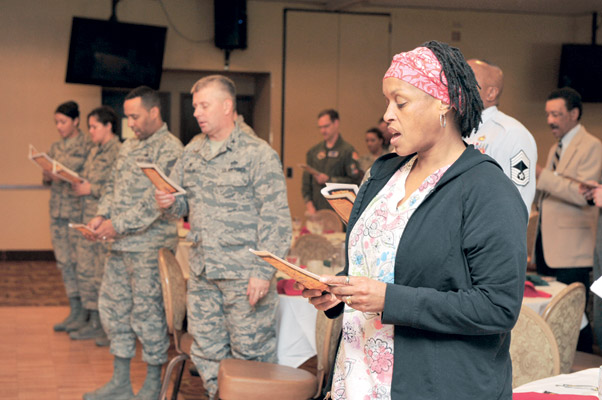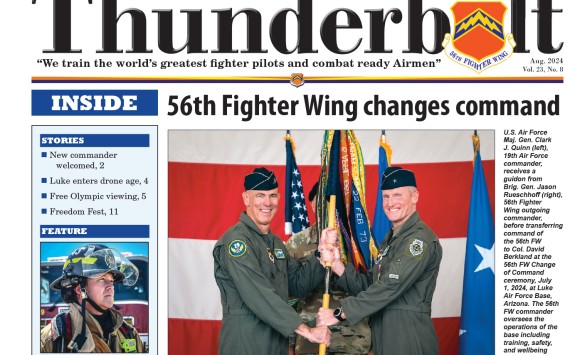Thunderbolts gathered to celebrate Black History Month Feb. 25 at Luke Air Force Base to remember the achievements made by African-Americans and recognize the central role they played in American history.
This year’s theme, “Hallowed Grounds: Sites of African-American Memories” has been selected by the Association for the Study of African-American Life and History.
After the singing of the National Anthem and the chaplain giving an invocation, attendees partook in a southern-style barbecue luncheon. Once attendees finished eating, Ben Bruce, 56th Fighter Wing ground safety manager and guest speaker, came to the stage.
“I have lived the last half of the twentieth century, so for me that half is not really history because at one point in my life, it was today,” Bruce said. “But the most important reason I’m here this morning is because I love America.”
Bruce continued to explain how the terms used for African Americans changed with time.
“Today, I’m not going to be politically correct,” he said. “I’m not going to use the term African-American. See, when I was growing up I was Negro, then I went south and I became colored, and then finally I was black before turning back to African-American — that’s a lot of changing,” he chuckled. “So what I decided to do was use the term I’m most comfortable with and that’s black.”
Black History Month is celebrated in the month of February, Bruce said. The month allows all Americans to learn about the history behind the month and remember the lives of those who made a significant and positive impact on American society.
“Black history is rich in culture — it’s art, sports, medicine, literature, education and engineering,” Bruce said. “Black people have contributed immensely in the American way of life and in every avenue.”
Bruce expounded on famous black Americans who served in the U.S. military.
“In 1770, Crispus Attucks was a Negro sailor who became the first man to die in the Boston Massacre,” he said. “Seven Americans were killed on the streets of Boston. This killing fueled the Revolutionary War. Five thousand men of color served Gen. George Washington in this war. The British stormed American shores and several black soldiers, such as Peter Salem and Caesar Brown received special commendations for their actions in the Battle of Bunker Hill. For the next eight years, all the way to the Battle of Yorktown, blacks served. Additionally, 180,000 blacks served in a nation-shaping event — the Civil War.”
Once Bruce completed sharing military history, he began to speak of his family history.
“As a child, I remember my father would take us to church on Wednesday nights,” he said. “I watched my father get on the floor, roll up in a ball and learn how to defend himself against a possible attack. He was one of the people who participated in sit-ins at demonstrations during the Civil Rights Movement. He was also one of the guys who was called Freedom Riders. Being a Freedom Rider was extremely dangerous. They would get on buses, go down south, and sit at the lunch counter in white restaurants and sometimes get arrested by the police. They were arrested for the act of civil disobedience, breaking the rules of segregation. My father said he remembered getting arrested, going to jail and being afraid he would not come out alive. That’s how dangerous it was.”
Bruce shared more personal stories before coming to a close.
“Thank you for letting me share some of my thoughts on black history during the building of America,” he said. “I’m very proud of each and every one of you. Remember, history makes us smarter, heritage makes us proud — be proud of yourselves and your history.”
For one Airman and National Anthem singer of the event, Black History Month is a month to be thankful.
“I feel like Black History Month is a time to reflect and be grateful for what our ancestors have done and what they had to go through to get us to where we are today,” said Senior Airman Timpson Brittany, 56th Civil Engineer Squadron operations management journeyman. “It’s also a time for Americans to learn what the month is about and how it came to be.”












